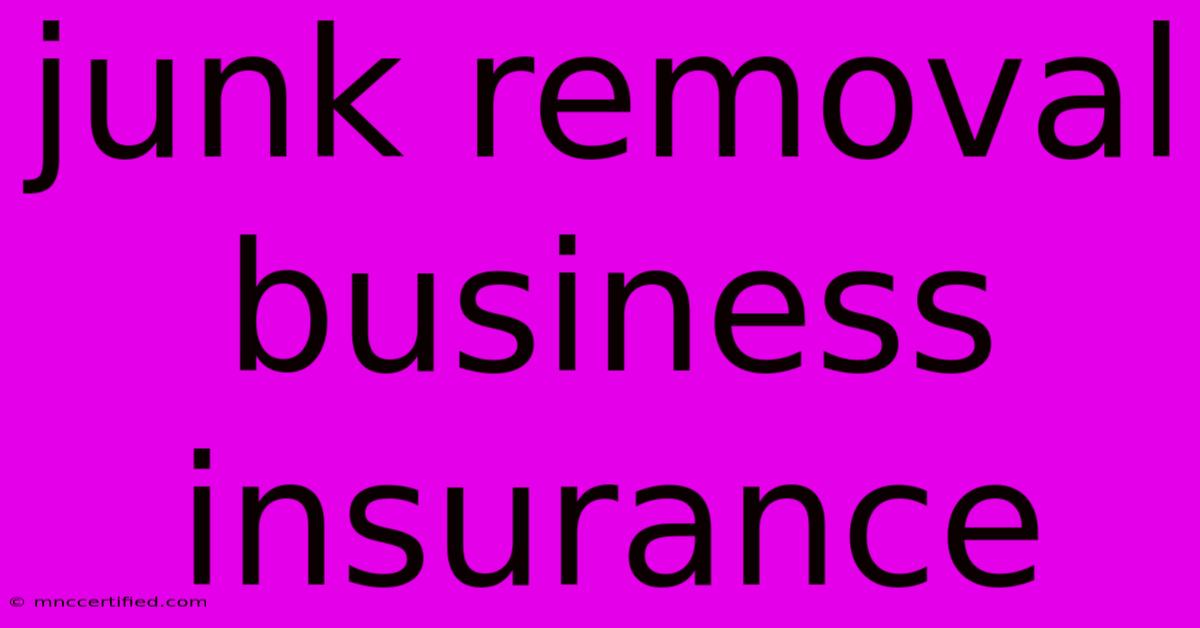Junk Removal Business Insurance

Table of Contents
Junk Removal Business Insurance: Protecting Your Assets and Reputation
Starting a junk removal business can be incredibly rewarding, offering flexibility and the satisfaction of providing a valuable service. However, it also comes with significant risks. Accidents, injuries, and property damage are all possibilities, making comprehensive insurance crucial for protecting your business, your employees, and your financial future. This guide will delve into the essential types of insurance you need for your junk removal business.
Understanding Your Risks: Why Insurance is Non-Negotiable
The junk removal industry involves inherent risks. You're handling heavy objects, navigating various properties, and operating vehicles – all potential avenues for accidents and liabilities. Without adequate insurance, you could face devastating financial consequences from:
- Accidents involving your employees: Workers' compensation insurance is vital to cover medical expenses and lost wages for employees injured on the job. Failing to provide this coverage can result in hefty fines and lawsuits.
- Property damage: Accidents happen. Dropping debris, damaging a customer's property during removal, or even causing damage while driving your truck, can lead to expensive claims.
- Bodily injury: Injuries to customers, passersby, or even your own employees are a very real possibility. Liability insurance protects you from the costs associated with medical bills, legal fees, and settlements.
- Vehicle damage: Your trucks are critical to your business operations. Comprehensive and collision insurance protects them against accidents, theft, and vandalism.
- Equipment damage: Your specialized equipment (like loaders, grapple trucks, or even simple tools) is vital. Insurance helps cover repairs or replacements in case of damage or theft.
Essential Insurance Policies for Your Junk Removal Business
Several key insurance policies will provide a robust safety net for your junk removal business. Let's explore each one:
1. General Liability Insurance: Your First Line of Defense
This is arguably the most crucial policy. General liability insurance protects your business against claims of bodily injury or property damage caused by your operations. This includes injuries sustained by clients, employees, or members of the public on your work sites. It also covers property damage to clients' homes, buildings, or other assets during the removal process.
2. Commercial Auto Insurance: Protecting Your Vehicles
Since your trucks are integral to your business, commercial auto insurance is absolutely necessary. This covers damages to your vehicles in accidents, as well as injuries to others caused by your drivers. Ensure your policy includes comprehensive and collision coverage for maximum protection.
3. Workers' Compensation Insurance: Protecting Your Employees (and Yourself)
If you employ others, workers' compensation insurance is legally mandated in most jurisdictions. This crucial policy covers medical expenses and lost wages for employees injured on the job. It also protects you from lawsuits related to workplace injuries. Even if you are a sole proprietor working alone, consider this option as it can offer some protection against accidental injuries.
4. Umbrella Liability Insurance: Enhanced Protection
An umbrella liability insurance policy provides additional liability coverage beyond what's offered by your general liability and commercial auto policies. It's a cost-effective way to dramatically increase your liability protection and provides an extra layer of security against significant claims.
5. Commercial Property Insurance: Protecting Your Assets
If you have a physical office or storage space, you'll need commercial property insurance to protect your buildings, equipment, and inventory from damage or loss caused by fire, theft, vandalism, or other covered perils.
Finding the Right Insurance Provider: Key Considerations
Choosing the right insurance provider is critical. Consider these factors:
- Coverage: Make sure the policy provides sufficient coverage for your specific risks.
- Cost: Compare quotes from multiple providers to find the best value.
- Reputation: Choose a reputable and financially stable insurer.
- Customer service: Select a provider with excellent customer service and a responsive claims process.
Optimizing Your Junk Removal Business for Safety and Reduced Risk
While insurance is vital, proactive risk management is equally important. Implement these safety measures to minimize accidents and claims:
- Thorough employee training: Train your employees on safe lifting techniques, proper equipment use, and hazard awareness.
- Regular vehicle maintenance: Keep your vehicles in top condition to prevent breakdowns and accidents.
- Clear communication: Ensure clear communication with clients to avoid misunderstandings.
- Detailed contracts: Use detailed contracts that outline responsibilities and liabilities.
By understanding the risks and securing the appropriate insurance coverage, you can protect your junk removal business from potential financial catastrophes, allowing you to focus on growth and success. Remember, a comprehensive insurance plan is an investment in the long-term stability and prosperity of your business.

Thank you for visiting our website wich cover about Junk Removal Business Insurance. We hope the information provided has been useful to you. Feel free to contact us if you have any questions or need further assistance. See you next time and dont miss to bookmark.
Featured Posts
-
Is Gold Bond Powder Safe For Dogs
Nov 23, 2024
-
Pennsylvania Halts Senate Race Recount
Nov 23, 2024
-
Amber Alert Canceled Stoughton Family Located
Nov 23, 2024
-
Portuguese Cup Sporting Amarantes Test
Nov 23, 2024
-
Insurance For Hot Shot Trucking
Nov 23, 2024